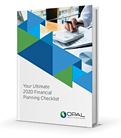Year-End Financial Checklist: 7 Planning Tips as We Wrap Up 2022
By brittany | November 22, 2022There’s no sugar-coating it: 2022 has been a challenging year financially for many Americans. And though inflation appears to be cooling as we wrap up the year, 2023 remains a question mark.
Which is why it’s more important than ever to do some careful year-end planning.
The economic changes we’ve seen this year have likely affected many aspects of your personal financial life—from your day-to-day spending to short- and long-term investing, and even your retirement goals. But those changes also have created opportunities. And if you make the time now to review your plan, you may be able to take advantage of tax, investing and other strategies that could benefit you and your family going forward.
With that in mind, here’s a checklist of things to consider:
1. Review Your Financial Plan
Your financial plan should include both your current and long-term wants and needs, as well as strategies to achieve those monetary goals. If rising costs, a volatile stock market, or changing personal priorities have put a new spin on your spending, saving or investing, you may need to revisit your plan. A good place to start may be to look at:
- Resetting Your Budget: Try to look at your budget as an opportunity to create independence rather than as a financial constraint. Once you have a clear idea of where your money is actually going, you may be able to make adjustments that better serve your goals. Need some help getting started? Contact your Opal advisor for the “Pay Yourself First” budgeting exercise and set yourself up for success in 2023.
- Dealing with Debt: Are you making headway in paying off debt as you move closer to retirement? Do the credit cards you use offer cash-back, points or other rewards that make sense for you? The end of the year is a good time to reevaluate your borrowing and make sure you’re getting the best possible rates and terms on credit cards and loans.
- Adjusting Your Retirement Income Plan: Understanding your budget can be especially important if you’re retired. Your Opal advisor can serve as a sounding board as you assess how much cash you’ll require in the year ahead and how those needs might affect your withdrawal rate and overall income plan.
2. Maximize Your Retirement Savings
There are several strategies that could help you make the most of your employer’s retirement plan and other benefits this year, or your own traditional or Roth IRA, including:
- Boosting Retirement Contributions: There’s still time to make the maximum contribution to your 401(k), 403(b) or similar retirement account. In 2022, the limit is $20,500, plus an additional $6,500 for those 50 and older. For the tax year 2022, you can contribute up to $6,000 to your IRA, or $7,000 if you’re 50 or older.
- Don’t Forget Your Health Savings Account: For 2022, the maximum HSA contribution limits are $3,650 for an individual and $7,300 for family coverage.
- Converting to a Roth Account: If you’ve been considering converting a portion of your IRA or 401(k) to a Roth account, this might be your year. If your portfolio balance is down this year (a 60/40 stock/bond portfolio is still down more than 15%), it may have created an opportunity to convert with a smaller tax bite in 2022. And as the market recovers, all the growth in your Roth account will be tax-free.
- Or Maybe a Back-Door Roth Conversion: If you’re participating in a 401(k) at work and already maxing out your contributions, this may be a way for you to shelter additional assets from taxes. This strategy also can provide a legal way to get around the income limits that can prevent high earners from owning a Roth.
3. Reevaluate Your Portfolio
If volatility changed the weighting of asset classes in your portfolio, it may be time for a tune-up. Here are a couple of steps to consider:
- Rebalancing Investments: Rebalancing your portfolio can help you maintain your preferred asset-allocation strategy and stick with your chosen risk tolerance levels. Given the markets’ ongoing unpredictability, you may find it makes sense to add some dividend-paying investments. These typically lower risk investments can help protect against market turbulence. And you may want to shorten bond durations to hedge against future interest rate risks. Selloffs like we’ve had in 2022 have historically led to tremendous opportunities 12 months later. Your Opal financial advisor can assist you in creating a plan that takes advantage of these circumstances.
- Performing a Year-End Tax Review: Losses in the stock and/or bond markets may have created an opportunity to save on your 2022 taxes. If you decide to sell shares at a loss, you can use that loss to cancel out capital gains or lower your taxable income by a maximum of $3,000 per year ($6,000 if married filing jointly). Any losses in excess of $3,000 can be carried forward to future years.
4. Revisit Where You Stash Your Savings
Most financial advisors recommend keeping a stash of cash available for emergencies. But that doesn’t mean you have to leave the entire amount sitting in a low-interest savings account—slowly losing money to inflation. Some low-risk alternatives you may want to discuss with your financial advisor include:
- Treasury Bonds: Short-term Treasury bond rates are the highest they’ve been in 15 years—and they’re exempt from state and local income taxes.
- I Bonds: Interest rates on government-backed I bonds are adjusted regularly to keep pace with inflation, and they, too, are exempt from state and local income taxes.
5. Making Charitable Contributions
Giving to qualifying charities allows you to support causes you care about—and you can get tax savings. Your Opal financial advisor can explain the many types of charitable giving, including:
- Qualified Charitable Distributions (QCDs): Individuals who are 70½ or older can donate all or a portion of their annual required minimum distribution (RMD) directly to charity and reduce their income taxes.
- Donating Highly Appreciated Stocks: Haven’t turned 70½ yet? Donating highly appreciated securities directly to charity could help you avoid paying capital gains tax when selling those investments.
- Donor Advised Funds: Donor advised funds can also provide a tax-, time- and cost-efficient way to donate to your favorite charities.
6. Review Your Estate Plan
As your life, family and net worth go through changes, so will your opportunity to leave behind a legacy. That’s why it’s crucial to:
- Update Your Beneficiaries: A yearly review of your beneficiaries can ensure that your plan works as you intended. While you’re at it, consider completing the “Opal Financial Life Organizer,” a personal financial roadmap for your loved ones to follow if you become ill or pass away.
- Think About Gifting: You can give up to $16,000 per person in tax-free gifts in 2022.
7. Consider Your Insurance Coverage
This is also a fitting time to review your various types of insurance to be sure you have the coverage you need. Some questions to ponder might include:
- Should you increase certain coverage types this year to offset higher replacement costs due to inflation?
- If your lifestyle has changed, do you need the same liability coverage?
- Has your wealth grown to a level that makes umbrella insurance—or more of it—a must?
- Is your life insurance coverage appropriate and are the beneficiaries you’ve named up to date?
Opal’s comprehensive “Annual Insurance Checklist” can help you fully assess your needs.
Setting Goals
Year-end planning is about looking back on what you’ve accomplished, deciding what needs to be changed, and setting new goals for the future.
One thing you might try is to envision what would make you feel financially free—and proud of what you’ve attained—three years from now. Write down every goal (big or small). Then ask yourself what you can accomplish in 2022 and 2023 that would put you on track for seeing that vision come true in 2026.
Ready to Get Started?
Acting now to make the most of the many financial planning opportunities available can help you end 2022 on a positive note—and build momentum for the new year. Schedule time now to meet with your Opal financial advisor, and be sure to ask about Opal’s “2022 Year-End Financial Planning Checklist.”
Our team will be happy to discuss any questions or concerns you might have, and to assist you and your family in taking the appropriate steps to achieve your financial goals.
Be a Smart Investor
Stay up-to-date with industry-leading information and news delivered straight to your inbox.
Get our timely insights delivered to your inbox (Blog)
Please remember that past performance may not be indicative of future results. Different types of investments involve varying degrees of risk, and there can be no assurance that the future performance of any specific investment, investment strategy, or product (including the investments and/or investment strategies recommended or undertaken by Opal Wealth Advisors, LLC [“OWA]), or any non-investment related content, made reference to directly or indirectly in this commentary will be profitable, equal any corresponding indicated historical performance level(s), be suitable for your portfolio or individual situation, or prove successful. Due to various factors, including changing market conditions and/or applicable laws, the content may no longer be reflective of current opinions or positions. Moreover, you should not assume that any discussion or information contained in this commentary serves as the receipt of, or as a substitute for, personalized investment advice from OWA. OWA is neither a law firm, nor a certified public accounting firm, and no portion of the commentary content should be construed as legal or accounting advice. A copy of the OWA’s current written disclosure Brochure discussing our advisory services and fees continues to remain available upon request or at www.opalwealthadvisors.com. Please Remember: If you are a OWA client, please contact OWA, in writing, if there are any changes in your personal/financial situation or investment objectives for the purpose of reviewing/evaluating/revising our previous recommendations and/or services, or if you would like to impose, add, or to modify any reasonable restrictions to our investment advisory services. Unless, and until, you notify us, in writing, to the contrary, we shall continue to provide services as we do currently. Please Also Remember to advise us if you have not been receiving account statements (at least quarterly) from the account custodian.




